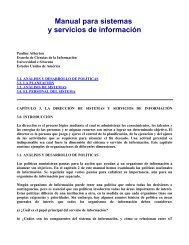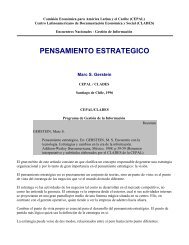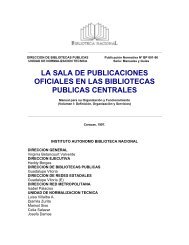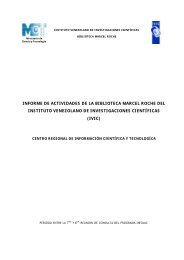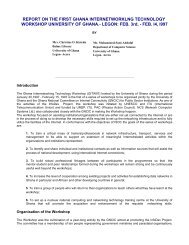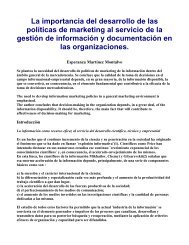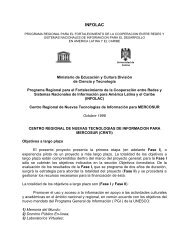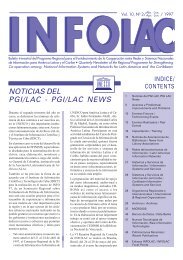Disponible en formato PDF - Infolac
Disponible en formato PDF - Infolac
Disponible en formato PDF - Infolac
You also want an ePaper? Increase the reach of your titles
YUMPU automatically turns print PDFs into web optimized ePapers that Google loves.
14<br />
In this research we were able to<br />
build up a list of 53 differ<strong>en</strong>t<br />
types of teleservices that are being<br />
offered from the four countries,<br />
among which those that can be<br />
found are related with information<br />
technologies; design, consulting,<br />
administration, translations, <strong>en</strong>gineering,<br />
call c<strong>en</strong>ter, research and<br />
developm<strong>en</strong>t, and sales, the most<br />
common.<br />
2Who would we sell them to?<br />
Or who could be interested in<br />
teleservices from our region?<br />
Results on the local and foreign<br />
companies’ int<strong>en</strong>tion to buy teleservices<br />
turned out to be quite <strong>en</strong>couraging.<br />
Out of 350 companies that answered<br />
the survey, 5% curr<strong>en</strong>tly hire teleservices<br />
in LAC, but 65% show an<br />
int<strong>en</strong>tion to buy teleservices in the<br />
following two years.<br />
3Could this way of working<br />
decrease emigration driv<strong>en</strong><br />
by the lack of opportunities?<br />
This question is closely related to<br />
the next one. However, it matters to<br />
bare in mind that what is exported<br />
through the sale of teleservices is<br />
the knowledge of the citiz<strong>en</strong>s of<br />
one country while not implying the<br />
physical transfer of the service provider.<br />
4Does is produce sources of<br />
work?<br />
The majority of autonomous teleworkers<br />
have to create their own<br />
jobs, but those who export are<br />
clearly the ones who have found<br />
new sources of work.<br />
Although it would be interesting to<br />
interview both parties in a contract<br />
or an export to assess whether the<br />
created job in one place jeopardized<br />
another or, on the contrary,<br />
it helped fill a rarely satisfied position,<br />
among other several reasons,<br />
mom<strong>en</strong>tarily we will only focus on<br />
the data collected through our research.<br />
From over 1605 curr<strong>en</strong>t teleworkers<br />
that answered the survey the largest<br />
exporters are Costa Rica with<br />
39 perc<strong>en</strong>t and Arg<strong>en</strong>tina with 25<br />
perc<strong>en</strong>t.<br />
Costa Rica is also the case with<br />
most migrating teleworkers (30%).<br />
Teleworkers working indep<strong>en</strong>d<strong>en</strong>tly<br />
repres<strong>en</strong>t betwe<strong>en</strong> 30 and 50% of<br />
the total respond<strong>en</strong>ts.<br />
5Does it allow greater social<br />
and labor inclusion?<br />
The number of diverse teleservices<br />
that we found teleworkers are offering,<br />
create a great perspective<br />
for inclusion. Among them we<br />
found teleservices of diverse complexity<br />
that embrace a variety of<br />
service providers. Ev<strong>en</strong> though<br />
the majority are professionals, we<br />
found that in countries where telework<br />
has had more dissemination<br />
and s<strong>en</strong>iority, such as in Arg<strong>en</strong>tina,<br />
the interest has ext<strong>en</strong>ded to tertiary<br />
levels of education. This would allow<br />
that a greater number of people<br />
were incorporated into the teleservices<br />
market in the future.<br />
Etis-Lac drew out three analysis<br />
corresponding to three subuniverses.<br />
These were teleworkers with<br />
physical disabilities, teleworkers<br />
desc<strong>en</strong>dants of native tribes and<br />
teleworkers by g<strong>en</strong>der.<br />
In summary there are no limitations<br />
if there is the knowledge, there are<br />
the technologies and there is the interest<br />
in this way of working. Technologies<br />
do not discriminate per se,<br />
the problem will be to deal with the<br />
asymmetries in the access to ICTs<br />
so that telework reaches those who<br />
need it and/or want it.<br />
6Why ar<strong>en</strong>’t Call C<strong>en</strong>ters<br />
dec<strong>en</strong>tralized?<br />
Since globalization and the devaluation<br />
process undergone by<br />
our curr<strong>en</strong>cy in the year 2001, Arg<strong>en</strong>tina<br />
started a maturation process<br />
and experi<strong>en</strong>ced a growth in<br />
off-shore operations for it can now<br />
be spok<strong>en</strong> of a dec<strong>en</strong>tralization of<br />
operations toward places where operational<br />
costs are lower.<br />
For these reasons, and within this<br />
new context we incorporated a<br />
fieldwork experi<strong>en</strong>ce, crossingover<br />
a series of technological, human<br />
and organizational variables,<br />
that ev<strong>en</strong> though do not allow<br />
g<strong>en</strong>eralizations neither allow a sole<br />
conclusion.<br />
The fieldwork experi<strong>en</strong>ce in ABSA,<br />
faced as main obstacle the external<br />
technological support. This was the<br />
most considerable source of restriction<br />
and not the personnel as it can<br />
usually be se<strong>en</strong> in differ<strong>en</strong>t papers<br />
on telework.<br />
From a managem<strong>en</strong>t perspective it<br />
should be pointed out that the need<br />
of operating a change process in the<br />
mind of the supervisor and being<br />
able to operate from a managem<strong>en</strong>t<br />
style based on trust is in order. This<br />
is a new chall<strong>en</strong>ge to be explored,<br />
specially if we are speaking of the<br />
call and contact c<strong>en</strong>ter industry,<br />
where we hope this study can help<br />
make decisions for change.<br />
7Are there any obstacles for<br />
exports at a small scale?<br />
We found that obstacles to teleservices<br />
exports can be, in g<strong>en</strong>eral,<br />
to put a price on them, ev<strong>en</strong><br />
though no obstacles were detected<br />
for those wishing to legally export<br />
their services through this way of<br />
working.<br />
The four countries under examination<br />
show asymmetries in their<br />
progression in terms of legislation<br />
that can facilitate the provision of<br />
cross-border services.<br />
Since these are cross-border services,<br />
it is important to take initiatives<br />
toward legal adaptation through<br />
international cooperation in order<br />
to face the changes pres<strong>en</strong>ted by<br />
the advancem<strong>en</strong>t of ICTs, so to allow<br />
that those offering services indep<strong>en</strong>d<strong>en</strong>tly<br />
or as an autonomous<br />
worker counted with the legal tools<br />
that make possible the relationship<br />
among the involved parties to be<br />
normal in all jurisdictions.


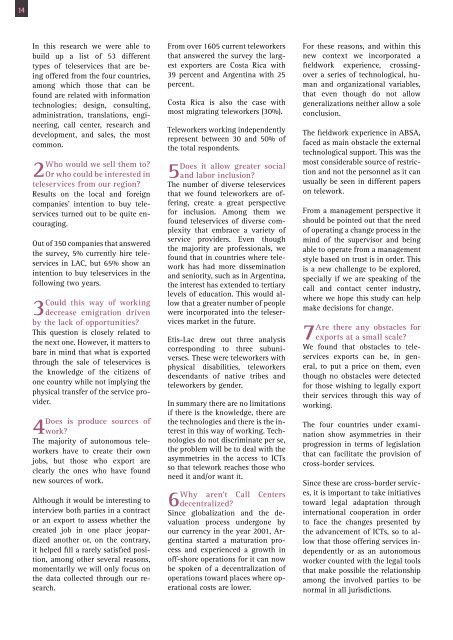
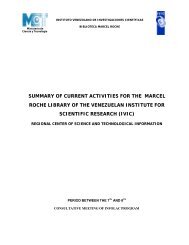
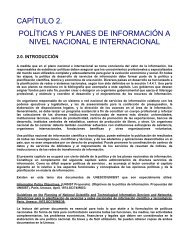
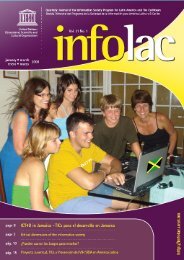

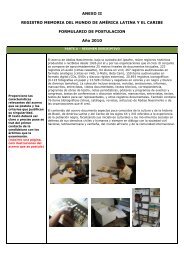

![ifaprep[1]. caribbean - Infolac](https://img.yumpu.com/37304916/1/184x260/ifaprep1-caribbean-infolac.jpg?quality=85)
